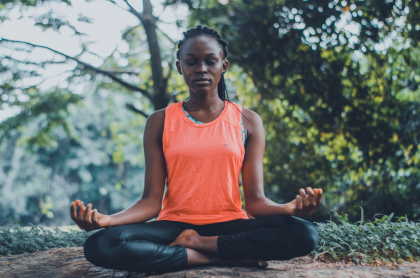The best ways to de-stress your life

Stress can sometimes be healthy and motivating, but too much stress over a prolonged period of time can lead to serious health issues. When your body senses trouble, your natural alarm system goes off, elevating your blood pressure, boosting your energy and preparing you to deal with your problem.Multiple studies have proven that sudden emotional stress, especially involving anger, can trigger heart attacks, arrhythmias and even sudden death.
So what can you do to reduce your daily stress and promote better health? Below is a list of ways to easily de-stress from the pressures of daily life.
Breathe Deeply
If you are suddenly feeling stressed, simply taking deep breaths will instantly make you feel calmer. Take a five-minute break from whatever you are doing, close your eyes, and take deep belly breaths where you only concentrate on your breath.
Listen to Soothing Music
This is another quick fix. Research has shown that listening to soothing music can lower your blood pressure, heart rate, and anxiety. Let the calmness of the music take over your emotions and bring you to a place of tranquility.
Make Time for Hobbies
Taking time to do the things you enjoy will bring a lot of happiness into your life and reduce the amount of time spent feeling stressed. Try to do something every day that makes you feel good, even if it’s only for fifteen minutes. It can be reading, knitting, crafting, playing your favorite sport, watching your favorite TV show or movie, or even exercising. Whatever makes you feel happy and at peace is what you should spend some time every day doing.
Meditate
Research suggests that daily meditation may alter the brain’s neural pathways and make you more resilient to stress. Meditation is also a great way for you to connect your mind and your body and really understand your emotions. You can either repeat a positive mantra or let your mind wander and explore until it finds peace.

Exercise
All forms of exercise can ease depression and anxiety by helping your brain release feel-good chemicals and by giving your body a chance to physically practice dealing with stress. This way, if you do encounter a sudden onset of stress, your body will be more equipped to deal with it and you’ll experience less dire consequences.
Eat Well
Eating a healthy, well-balanced diet may help control your moods. Your meals should be full of vegetables, fruit, whole grains and lean protein for energy and satiety. Avoid refined sugars as they lead to an energy crash that will worsen your mood and increase stress. It is also important not to skip any meals because hunger can put you in a bad mood, which will increase your stress.
Reduce Your Caffeine Intake
Caffeine is a stimulant found in coffee, tea, chocolate and energy drinks. High doses can increase anxiety, but the levels vary person-to-person. When you start feeling jittery, it’s time to stop your caffeine consumption for the day. You can also try lowering your caffeine intake by a little bit each day to see if it makes a difference in your stress.
Get More Sleep
You’ll find it easier to reduce your caffeine intake if you’re getting more and better sleep. Since stress can physically wear out your body, without sleep, you will experience the effects of stress that much more. Maximize your relaxation before going to sleep by reading or meditating to take your mind off of the stressors of your day and to help you fall into a deeper sleep. A good night’s sleep will help your body and mind repair themselves so you awaken refreshed and ready to take on the challenges of the coming day.
Be Present
Focus on what is going on right in this moment. Focusing on things to come can cause major anxiety and stress. Instead, be mindful of what you can accomplish right now and enjoy what is going on around you. Living in the moment will liberate you from the stressors of tomorrow.
Talk It Out
Having a positive conversation with someone you care about will always make you feel better and these conversations can also be used to get a fresh perspective on a situation that is causing you stress. Venting about your problem and coming up with an action plan with someone you trust is a guaranteed way to reduce the stress it is causing you. Talking to others lets you know you are not alone in your struggle and will give you more confidence to take control of your life.
Identify and Avoid Your Triggers
Figure out what the biggest causes of stress are in your life and do what you can to eliminate – or at least reduce – them. If you struggle to identify your triggers, keep a journal to make note of the times you feel most anxious and look for patterns that will bring you to the cause of your stress. Even if you cannot eliminate a trigger, knowing that it is one will help give you more control over it and make you more prepared when facing it.
Be Grateful
The best way to not think about the negatives of your life is to focus on the positives. Let the good push out the bad by taking time each day to be grateful for all of the wonderful things in your life. When you are able to look at the big picture and realize how blessed your life is, the little negatives won’t feel so stressful and burdensome anymore. You can even keep a journal of everything you are grateful for so when you start feeling stressed, you can spend a few moments going through your notes to remind yourself what really matters.
The bottom line when it comes to stress
Although it is difficult to eliminate stress completely, it is very possible to manage and reduce it significantly, leading to a healthier and happier life. Reducing stress can lower blood pressure, make you less likely to catch a cold, increase memory, make you less likely to have a stroke or suffer from depression, allows you to think more clearly, keeps acne at bay, and keeps you at a healthier bodyweight.
Please remember that relaxation looks different to everyone, so what might work for someone else may not work well for you. Try out the different techniques listed above to figure out the best prescription for reducing your stress. And above all, don’t stress over being stressed! You have the power to easily turn it around.
Similar articles
-
Discover the power of conscious deep breathing on your health
inBreathing is something the body does without any conscious effort, but the power of conscious deep breathing is definitely no joke!
-
Our top tips and tricks to improve your sleep over time
inWith COVID-19 running rampant, holistic health coach Kelly Cohen is here to show you ways to improve your sleep over time.
-
Is there a connection between cancer, diet and CBD?
inAs more and more Americans get sick with cancer, Holistic Cannabis Practitioner Erin Kenney looks at the connection between cancer, diet and CBD.
More in Lifestyle
-
Natural ways to get rid of garden pests for a green garden
inLooking for some natural ways to get rid of garden pests? It’s not that difficult – I’ll guide you on which substances you should be using
-
Tips for feminine hygiene products for every woman
inCertified Wellness Consultant Britlynn Ward gives some of her top tips for feminine hygiene products so that you know what to look out for!
-
Turn meditation into a routine that you can practice every day!
inDo you want to turn your meditation into a routine? Guest writer Ava Johanna guides us through the steps to make it easy!

















